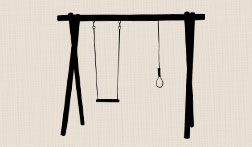Submitted by ssaliba on
CRIN is campaigning for the abolition of inhuman sentencing, defined to include the death penalty, corporal punishment and life imprisonment.
We want to emphasise that while, for the purposes of this campaign, CRIN is calling for the abolition of the juvenile death penalty, we believe that the death penalty should be abolished for all individuals, regardless of age.
IJJO encourages the improvement of juvenile justice systems and policies, the implementation of international standards, the strengthening of professional competence in the field, and the exchange of innovative good practices.
This submission will focus on the death penalty for children but within the broader context of children’s rights. While we would welcome the abolition of, or moratoria on, the death penalty, we are concerned that this leads to an increase in sentences of life imprisonment. Life imprisonment is also a form of cruel and inhuman punishment. When the death penalty is abolished the alternative must not be to sentence children to life imprisonment.
As stated in our submission of last year, we believe that it is important for the Secretary-General to address the death penalty within the wider context of sentencing of children as per the Secretary-General’s Study on Violence against Children in which the Secretary-General recommends that death penalties be suspended and States should take: “appropriate legal measures to convert them into penalties that are in conformity with international human rights standards.”
For children this means taking account of Article 37 of the Convention on the Rights of the Child (CRC), which explicitly requires that deprivation of liberty be use only as a last resort and for the shortest appropriate period of time (article 37(b)). The CRC also requires that the best interests of the child be a primary consideration “in all actions concerning children”, including those taken by courts of law (article 3(1)), and that States ensure “to the maximum extent possible the survival and development of the child” (article 6).
In November 2012, the UN General Assembly also passed a resolution calling on states to “ensure that, under their legislation and practice, neither capital punishment nor life imprisonment without the possibility of release, nor corporal punishment is imposed for offences committed by persons under 18 years of age” and encouraged states to “consider repealing all other forms of life imprisonment for offences committed by persons under 18”.[1] In September 2013, the Human Rights Council passed a resolution urging states to ensure that “under their legislation and practice neither capital punishment nor life imprisonment are imposed for offences committed by persons under 18 years of age”.[2]
States should, therefore, review all their sentencing practices with regards to children and ensure they are in line with the CRC and other human rights standards. When abolishing the death penalty, states should not institute life imprisonment - another prohibited form of sentencing - in its place.
Status of the juvenile death penalty
Our research indicates that in fourteen countries,[3] capital punishment for children remains on the statute books or is carried out despite being prohibited. Bangladesh abolished the death penalty for children by enacting the Children’s Act 2013.
Only a handful of states are known to have executed a juvenile in recent years. However, as long as the sentence remains a possibility in national law, children run the risk of being executed should the situation in a given country change.
Developments between 1 April 2013 and 31 March 2014
Executions of child offenders have continued in Iran. Recent reports indicate that in July 2013 a 25 year old man was executed for an offence allegedly committed when he was 15; in August and 18-year-old was executed for an offence allegedly committed while he was 12; in September an 18-year-old was executed for an offence committed while he was 17 and in late September, a man was executed for an offence committed while he was 14.[4]
In Gaza, a 28 year old man was hanged for two offences, one of which he allegedly committed while he was 14 years old.[5]
No executions have been carried out in the Maldives since 1952, but on 2 May, two people were sentenced to death by the Juvenile Court in relation to a murder committed when they were under 18 years of age.[6]
[1] A/C.3/67/L.34, para. 18
[2] A/HRC/24/L.28, para. 22
[3] India (Jammu and Kashmir), Iran, Lao People’s Democratic Republic, Malaysia, Maldives, Mauritania, Nigeria, Pakistan, Qatar, Saudi Arabia, Somalia, Tonga, United Arab Emirates and Yemen.
[4] See FIDH, Death penalty in Iran: A state terror policy, October 2013, p. 9.
[5] ABC News, “Hamas hangs Gaza man, despite protests” 2 October 2013. Available at: http://www.crin.org/en/library/news-archive/opt-hamas-hangs-gaza-man-despite-protests.
[6] Amnesty International, Death Sentences and Executions 2013, p. 24

